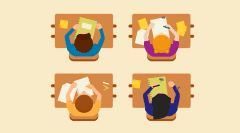Employers and Universities: Work with us?

60 Second Interview: Teaching assistant
Sophia has been working as a teaching assistant for one year... and she loves it! In today's interview, she explains how she got into education after graduating from uni and tells us about her next challenge - training to become a teacher.

Name: Sophia Weston
Employer: Norfolk County Council
Industry: Education & Teaching
What is your job? Teaching assistant
How long have you been doing this job? 1 year
Education
University: University of Sussex
Degree subject: Sociology
A-levels: Sociology, government and politics, psychology, citizenship
1. What was your very first job?
My first job was working as a waitress in a pub. I did this while I was studying during my A-levels and degree but this is my first post-education job that related to my career choice.
2. What did you want to do when you were at school?
I always knew I wanted to work with children in my career but I wasn’t sure if I wanted to go into social work or teaching. Therefore, I studied subjects I enjoyed and then decided to work in the Education system once I had graduated.
3. How did you find out about the industry?
I have family members who work in teaching and they provided me with some insight. I have also had a lot of work experience throughout my education in primary schools that provided me with some contacts and valuable experiences.
4. How did you get there?
I initially volunteered as a classroom assistant two days a week in a local primary school which provided me with fantastic, hands on experience working with children aged 4-11. From this I applied for a teaching assistant (TA) post in Norfolk that specifically requested graduates. I went for an interview and was offered the job on the spot!
5. What is a typical day like?
A typical day involves working with children within the curriculum subjects, this can be one-to-one or in small group work. A lot of TAs are used to help support children who may be struggling and this can be behaviourally, academically or emotionally. My day includes intervention work, putting up displays, helping the teacher with jobs such as getting lessons organised, supporting children’s understanding in lessons, supervising behaviour in the classroom, providing short phonic lessons and generally being guided by the teacher in anything that needs doing that day.
6. What’s the best thing about your job?
The children. They make me laugh every single day and I love being able to support their learning, it is a very rewarding career and every single day is different. The staff support and teamwork is also vital and I have made lovely friends in my colleagues who have supported me in my first steps of becoming a teacher.
7. What is the most challenging thing about your job?
The behaviour can be challenging at times and I have experienced a lot of high-level behaviour. However, this is also the most rewarding aspect of the job as you can help them to understand their emotions and support them in becoming the best versions of themselves.
8. What advice do you have for people who want to do what you do?
Go and get as much work experience as you can. Every school is different and they all come with different experiences and challenges. You can be a TA without a degree but many schools provide training and NVQs to support you in helping the children so look out for these schools. Overall though you need to care about the children in order to support and guide them.
9. What things do you wish you’d known before starting your career?
How rewarding it is. It can be hard work at times but it is worth it to see a child achieving from your help.
10. Where would you like to be in 5 years?
I would like to be a qualified teacher who is passionate about supporting early year pupils in becoming successful and enthusiastic learners. I am lucky that I worked as a TA at a school that supports me in this career aspiration.
Thanks Sophia! If you'd like to follow in her footsteps, we have plenty of advice on how to begin your career in education:
How to become a teaching assistant
How to become primary school teacher
